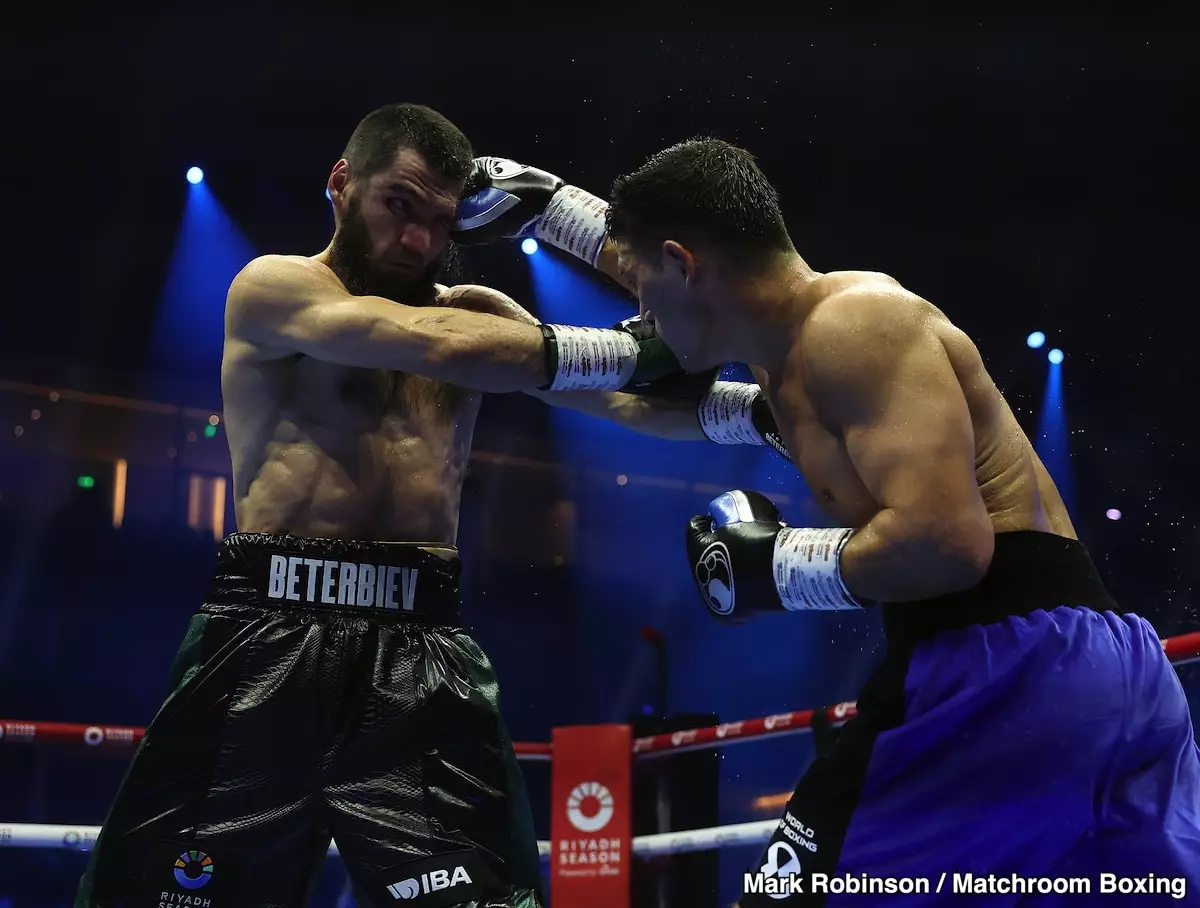The recent showdown between Artur Beterbiev and Dmitry Bivol for the undisputed light heavyweight championship captivated boxing fans around the world. The event took place at the Kingdom Arena in Riyadh, Saudi Arabia, on a night that promised high stakes and unparalleled intensity. Both fighters entered the ring with credentials that spoke volumes; Beterbiev, the IBF, WBC, and WBO champion, boasted an undefeated record and a fearsome knockout ratio, while Bivol, known for his technical prowess and agility, was aiming to unify the division.
As the rounds unfolded, the anticipation reached a crescendo, with experts and trainers alike speculating on the outcome. Among them was Teddy Atlas, a seasoned boxing analyst and trainer, who had Beterbiev narrowly ahead on the scorecards, calling the bout a closely contested affair—115-113 in favor of Beterbiev. This score mirrored the verdict of the judges, who ultimately granted the victory by majority decision.
The fight began with both competitors showing their unique styles. Bivol, strong in the early rounds, relied heavily on his quick combinations and agile footwork to keep Beterbiev at bay. However, as the bout progressed, a noticeable shift occurred. Beterbiev, known for his power, began to adapt, absorbing Bivol’s attacks while incrementally increasing his pressure. By the seventh round, the fight reached a pivotal moment. Beterbiev’s body punches began to sap Bivol’s energy, an effect that became increasingly evident in the later stages of the match.
Atlas noted that after the seventh round, Bivol’s earlier rhythm dissipated, resulting in a more defensive posture. “Bivol did a great job of being defensive when he had to, but being set for offense,” Atlas remarked, pointing out Bivol’s struggle to maintain his earlier aggression. Beterbiev’s relentless advancement transformed the fight. The tide had undoubtedly turned, evident in Bivol’s body language as the rounds wound down—it was clear he was running out of steam.
Pressure and Performance: The Turning Point
The crux of the battle lay in how each fighter responded to the pressure. Beterbiev, renowned for his mental and physical toughness, demonstrated a seasoned approach, capitalizing on moments where Bivol hesitated. While Bivol had success at maintaining his distance early on, once Beterbiev started landing significant body shots, the balance of control shifted. As Atlas pointedly illustrated, Bivol’s aggressive starts in rounds often fizzled into frazzled defense as Beterbiev responded with calculated ferocity.
In discussions surrounding the fight, Atlas emphasized the importance of recognizing the fighters’ evolutions. As Beterbiev, nearing 40, faced off against a younger opponent, the question arose about his endurance. Indeed, there were moments, particularly in the ninth round, where Beterbiev appeared to reserve some energy, which could have spelled disaster in the hands of more aggressive tactics.
Post-fight reactions were predictably polarized. Bivol’s promoter, Eddie Hearn, could be seen defending his fighter’s performance vocally, alleging that Bivol was robbed. This is a common narrative in boxing—a promoter’s instinct to protect the viability of their fighter’s career and image. Atlas, however, highlighted the importance of a fair assessment of the performance; he reinforced the judges’ decision, declaring that Beterbiev was the rightful victor.
Interestingly, Atlas highlighted the discrepancies among the judges’ scores, reminiscent of contentious decisions in boxing history. While the majority ruled in favor of Beterbiev, the narrow margins indicated how closely contested the fight truly was. Atlas himself had the fight close at 115-113, highlighting the tight competition between two elite fighters.
The championship bout between Artur Beterbiev and Dmitry Bivol presented a fascinating case study of skill, strategy, and mental fortitude. The fight encapsulated the essence of boxing—where physical prowess meets psychological warfare. Beterbiev’s ability to absorb pressure and deliver punishing shots in critical moments was key to his triumph. Meanwhile, Bivol’s initial dominance gave way to exhaustion, prompting questions about his ability to maintain intensity when faced with overwhelming adversity.
As discussions continue in the boxing community, one thing is unequivocal: this match will resonate in the memories of fans and analysts, a testament to the unpredictable nature of the sport and the heart-stopping drama that only a title fight can deliver.

